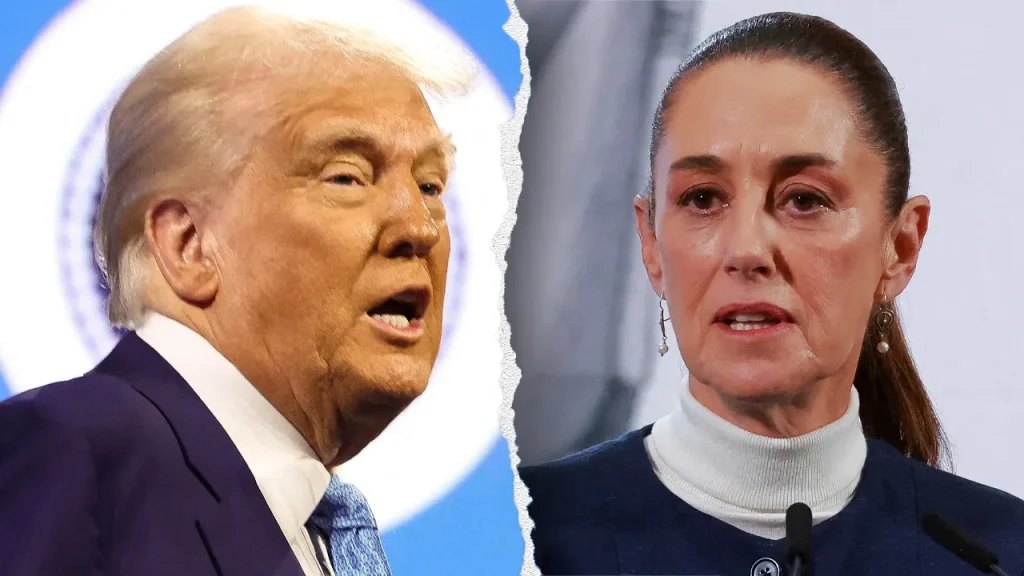Mexican President Claudia Sheinbaum announced on Thursday her intention to propose constitutional reforms to safeguard the country’s sovereignty amid concerns about potential U.S. military actions against Mexican drug cartels. This declaration follows the designation of six Mexican drug cartels as foreign terrorist organizations by the Trump administration, raising alarms about increased intervention by U.S. forces. Sheinbaum emphasized that Mexico will not tolerate any form of foreign interference that threatens its national integrity.
| Article Subheadings |
|---|
| 1) Sheinbaum’s Proposal for Constitutional Reforms |
| 2) U.S. Cartel Designations and Their Implications |
| 3) Responses from Mexican Leadership |
| 4) Legislative Measures Against Gun Trafficking |
| 5) Broader Context of U.S.-Mexico Relations |
Sheinbaum’s Proposal for Constitutional Reforms
In her statements, Claudia Sheinbaum outlined plans to amend the Mexican Constitution to strengthen the country’s sovereignty, particularly in response to U.S. concerns regarding drug cartels. The proposed reforms aim to encapsulate previous legal limits on the operations of foreign agents within Mexico, ensuring that any foreign entity must operate under the supervision of Mexican authorities. This move is particularly critical given the backdrop of recent U.S. policies that could lead to military interventions along the border. Sheinbaum articulated her determination to protect Mexico’s national identity and self-governance, insisting that “the Mexican people will not accept under any circumstances interventions, interference or any other act from abroad.”
U.S. Cartel Designations and Their Implications
The Trump administration classified six notorious Mexican drug cartels as foreign terrorist organizations, a decision that has generated significant controversy. The cartels identified include the Sinaloa, Jalisco, Gulf, and Zetas Cartels, among others. This designation raises the spectre of potential U.S. military operations within Mexico, purportedly to combat escalating drug-related violence. Following these developments, concerns arose within the Mexican government about the lack of consultation with Mexican officials regarding such actions. Many fear that this could pave the way for a military presence across the border, undermining Mexico’s sovereignty and exacerbating any existing tensions.
Responses from Mexican Leadership
In light of these recent events, Mexican leadership has been unified in its condemnation of U.S. policies facilitating such designations. Andrés Manuel López Obrador, Sheinbaum’s predecessor, had previously established also legal frameworks limiting the extent to which foreign agencies, including U.S. law enforcement, could operate within Mexican territory. Sheinbaum’s intention to enshrine these legal measures constitutionally reinforces the country’s stance on remaining autonomous in matters of drug enforcement—an area deeply impacted by cross-border trafficking and violence. Sheinbaum stated emphatically: “What we want to make clear in the face of this designation is that we do not negotiate sovereignty.”
Legislative Measures Against Gun Trafficking
In her proposals, Sheinbaum also aims to introduce harsher penalties for those involved in gun trafficking, which is a pressing issue affecting public safety in Mexico. The Mexican government has consistently called for the United States to increase measures and controls to prevent the illicit flow of firearms into Mexican territory. This call to action emphasizes a collaborative responsibility between the two nations in addressing trafficking dynamics and minimizing the associated violence that impacts countless lives on both sides of the border. By creating stronger legislative measures, Sheinbaum hopes to tackle the root causes of gun-related violence linked to organized crime.
Broader Context of U.S.-Mexico Relations
This recent conflict forms part of a broader narrative characterizing U.S.-Mexico relations, particularly regarding border security and drug policy. Historical context reveals long-standing complexities, including the U.S. approach to combating drug cartels often being perceived as unilateral and invasive by Mexican authorities. Past efforts have frequently warranted criticism for not sufficiently integrating the Mexican perspective, leading to strained diplomatic relations. Highlighting Mexico’s commitment to confronting these challenges on its terms underscores the evolving nature of this bilateral relationship, particularly under Sheinbaum’s administration, which is driven by the principles of national integrity and collaboration without external interference.
| No. | Key Points |
|---|---|
| 1 | Sheinbaum proposes constitutional reforms to safeguard Mexico’s sovereignty. |
| 2 | Six drug cartels have been designated as foreign terrorist organizations by the Trump administration. |
| 3 | Mexico was not consulted prior to the U.S. designation decision, fueling tensions. |
| 4 | Sheinbaum seeks to create tougher laws against gun trafficking to address violence. |
| 5 | The legislation reflects a broader context of U.S.-Mexico relations and existing challenges. |
Summary
The recent developments concerning U.S. designations of Mexican drug cartels as foreign terrorist organizations and the subsequent response from President Claudia Sheinbaum illustrate a significant moment in Mexico’s political landscape. Her readiness to propose constitutional reforms underscores a commitment to asserting Mexico’s sovereignty while addressing issues such as drug trafficking and foreign influence. As both nations navigate this complex terrain, the discussions about cooperation and respect for national boundaries will remain vital to future relations.
Frequently Asked Questions
Question: What prompted President Sheinbaum to propose constitutional reforms?
President Sheinbaum’s proposal for constitutional reforms was prompted by the Trump administration’s designation of six Mexican drug cartels as foreign terrorist organizations, leading to concerns over potential U.S. military intervention in Mexico.
Question: How do the designated cartels impact U.S.-Mexico relations?
The designation of the cartels affects U.S.-Mexico relations by increasing tensions over sovereignty and the potential for military actions, which Mexico defines as a violation of its national integrity.
Question: What measures is Mexico taking against gun trafficking?
Mexico is seeking to implement harsher penalties against individuals involved in gun trafficking in response to rising violence associated with Mexican drug cartels, highlighting the need for cooperation from the U.S. to curb arms smuggling.


